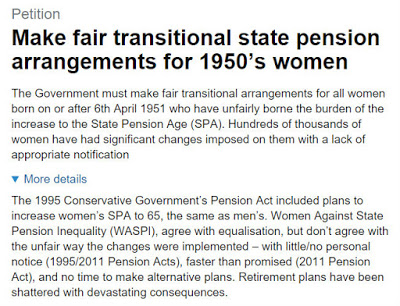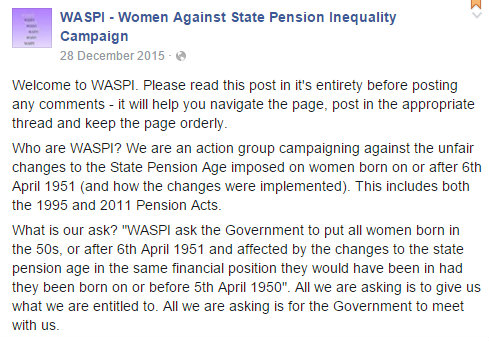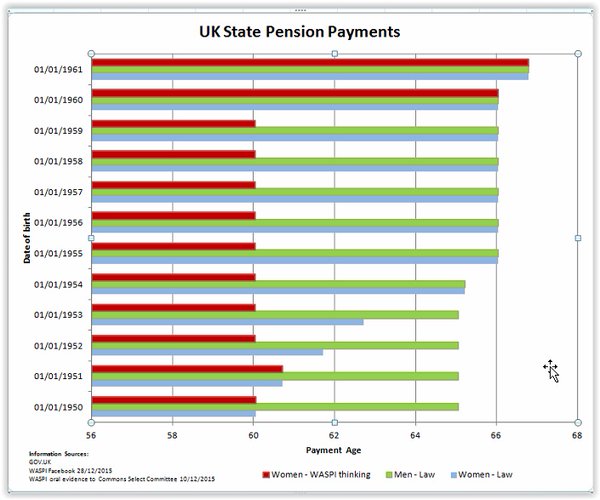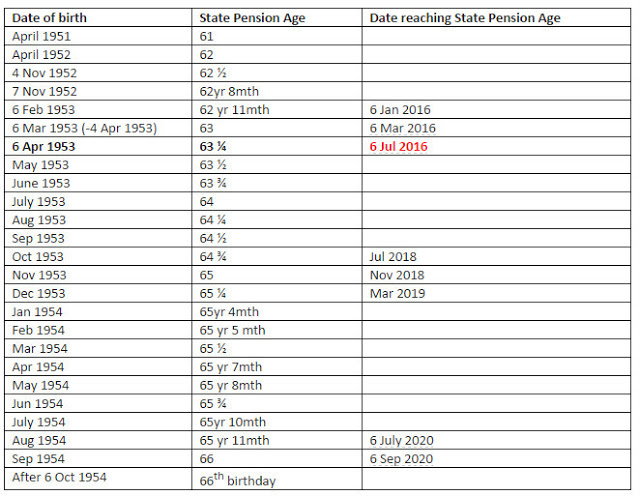As Henry Tapper puts it, today is WASPI day. Today is the day that "Women Against State Pension Inequality" get the Westminster debate for which they have campaigned.Eh, wait? Wasn't there a debate on this back in early January?Yes, there was. It was a backbench motion proposed by the SNP MP Mhairi Black. It called on the government to re-examine the acceleration of the equalisation of women's and men's pension ages in the 2011 Pensions Act, which added up to 18 months to the state pension age of some women born in the 1950s: That this House, while welcoming the equalisation of the state pension age, is concerned that the acceleration of that equalisation directly discriminates against women born on or after 6 April 1951, leaving women with only a few years to make alternative arrangements, adversely affecting their retirement plans and causing undue hardship; regrets that the Government has failed to address a lifetime of low pay and inequality faced by many women; and calls on the Government to immediately introduce transitional arrangements for those women negatively affected by that equalisation. The motion was carried by 158 votes to zero, a remarkable achievement for Black, the youngest MP in the House of Commons. But the Government is not bound to take any notice of it, and so far has declined to do so.And it wasn't what WASPI wanted anyway.
Topics:
Frances Coppola considers the following as important: benefits, inequality, pensions
This could be interesting, too:
Jeremy Smith writes UK workers’ pay over 6 years – just about keeping up with inflation (but one sector does much better…)
Nick Falvo writes Homelessness among older persons
Robert Skidelsky writes The Roots of Europe’s Immigration Problem – Project Syndicate
Nick Falvo writes Report finds insufficient daytime options for people experiencing homelessness
Eh, wait? Wasn't there a debate on this back in early January?
Yes, there was. It was a backbench motion proposed by the SNP MP Mhairi Black. It called on the government to re-examine the acceleration of the equalisation of women's and men's pension ages in the 2011 Pensions Act, which added up to 18 months to the state pension age of some women born in the 1950s:
The motion was carried by 158 votes to zero, a remarkable achievement for Black, the youngest MP in the House of Commons. But the Government is not bound to take any notice of it, and so far has declined to do so.That this House, while welcoming the equalisation of the state pension age, is concerned that the acceleration of that equalisation directly discriminates against women born on or after 6 April 1951, leaving women with only a few years to make alternative arrangements, adversely affecting their retirement plans and causing undue hardship; regrets that the Government has failed to address a lifetime of low pay and inequality faced by many women; and calls on the Government to immediately introduce transitional arrangements for those women negatively affected by that equalisation.
And it wasn't what WASPI wanted anyway. They are not really interested in the 2011 change. Their aim is much larger: payment in lieu of pension at 60 for all women born between April 1951 and December 1959 whose pension age has risen as a consequence of the 1995 and 2011 Pension Acts. This is why they continued to drum up support for their petition even after Mhairi Black's motion was carried unanimously.
On Monday last week, in an interview on BBC2's Victoria Derbyshire show, one of the WASPI women, Wendy Eachus, made a heartfelt case for the state pension to be paid from her 60th birthday. She described how her dream of stopping work and visiting her family in Australia and Canada had been shattered. In her words: "I wanted to do some travelling and enjoy life a bit while I'm still fit enough to do so".
The following day, Simon Read, in the Independent, wrote a sensible piece particularly highlighting the plight of women affected by the 2011 change and women born 1951-3 who will not qualify for the new State Pension. He featured Wendy's interview.
But there's a problem. Wendy Eachus was born in 1956. She is not one of those affected by the 2011 change. And when she reaches her state pension age in 2022, she will receive the new State Pension. Simon Read's piece is not about her. It just shows how confused the whole subject is that a good journalist like Simon Read managed to miss this.
By choosing Wendy Eachus to front this interview, WASPI shot themselves in the foot. They inadvertently revealed their real aim on mainstream media. No more could they pretend that this was about "fair transitional arrangements" for those caught by the 2011 change. No, it is all about the 1995 equalisation of mens' and womens' pension ages, which affects younger women more than older ones. Wendy herself made it clear that she wants the pension at 60 to which she believes she is entitled.
In her briefing to today's debate, the Pensions Minister, Ros Altmann, summarises the WASPI demand thus:
It is fair to say that this aim is not clearly expressed in the petition, which simply calls for "fair transitional arrangements" for women born in the 1950s:The Debate is about the WASPI petition, claiming to call for ‘transitional arrangements’ for 1950s women whose state pension age has increased from age 60. These so-called ‘transitional arrangements’ actually call for all 1950s women to be paid their state pension from age 60. They are effectively and unequivocally asking Government to reverse the women’s pension age changes of the 1995 Pensions Act not just the 2011 Pension Act. This would give thousands of pounds to each of these women.
But it is pretty clearly stated on their Facebook page:
More importantly, it was explicitly stated by Anne Keen, one of the co-founders, in her verbal evidence to the Work and Pensions Committee:
Ros Altmann appears to be correct. Putting all 1950s women into the financial position that they would have been in had they been able to claim their state pension on their 60th birthday, as women born prior to 5 April 1950 did, is equivalent to rolling back the state pension rises in the 1995 and 2011 Pension Acts."Basically, what we are asking – and we feel this is a very fair ask – is for the Government to put all women in their 50s born on or after 6 April 1951 and affected by the state pension age in exactly the same position they would have been in had they been born on or before 5 April 1950. …all our lives we expected to receive our pension when we were 60...Although there was not a written contract as such there was a psychological contract."
But WASPI have repeatedly denied that this is the correct interpretation. They claim to support equalisation of womens' and mens' pension ages. They insist that the issue is inadequate notice, and that the demand is for "fair transitional arrangements", not repeal of the 1995 and 2011 Pension Acts. And they've convinced a lot of people. Over 135,000 have signed the petition.
The 1995 Act included transitional arrangements. It delayed the start of the equalisation by 15 years so that women had adequate time to prepare. And it provided for women's pension age then to be raised gradually over the course of 10 years, from 2010-20. All women born prior to April 1950 would retire on their 60th birthdays, but for those born from April 1950 to March 1955 the SPA would rise by one month in two. All women born from April 1955 onwards would retire at 65.
The 2011 Act accelerated the 1995 change for women born 1953-4, and added an extra year for those born September 1954 onwards. They will now retire at 66, not 65. Wendy Eachus was sent a letter about this change. The trouble was, she didn't know about the 1995 change, because DWP communication was - to put it mildly - inconsistent. So to her, this letter told her not about a 1-year increase, but about a 6-year one.
The DWP says that "all women were written to". This is now true for 1950s women, though not yet for younger ones: most women born in the 1960s and 70s, whose pension age was 60 when they started work, still have not been written to about the rises. But the DWP's statement misses the WASPI point about notice. Receiving a letter telling you that your state pension age has effectively risen by six years when you are less than two years from the state pension age that you expected is a terrible shock, and for some women will have caused financial as well as emotional distress. It is unfair to blame women for DWP communication cock-ups.
WASPI argue that the 1995 transitional arrangement was "unfair" because it was not properly communicated. In response to this, WASPI are demanding not the repeal of the 1995 Act, but the elimination of the transitional arrangements put in place in 1995 and amended in 2011. Would this create "fair transitional arrangements"?
If the WASPI demand were met in full, all 1950s-born women would in effect receive their pensions as if entitled to them on their 60th birthday. No doubt they would regard this as "fair". But women born in 1960 would not receive them until their 66th birthday. So a woman born on 31st December 1959 would receive the equivalent of six years' more state pension than her classmate born 1st January 1960.
The original transitional arrangements were designed to prevent severe cliff edges like this: even the 2011 acceleration did not create anything as sharp as this. The cliff edge that the WASPI demand would create if met in full is clearly shown on this chart from Suzy Allbright:
What about the WASPI claim that they support equalisation of state pension ages? Indeed they do - for the same group of slightly younger women. Under the WASPI plan, a woman born 1st January 1960 would receive her state pension at the same age as her male classmate born the same day. But a woman born 31st December 1959 would effectively receive her state pension SIX YEARS earlier than a man born the same day. So WASPI support equalisation, but for their younger sisters, not for themselves.
As Ros Altmann puts it in her briefing to the debate today, "They call their campaign ‘Women Against State Pension Inequality’, but its demands could perhaps be more accurately described as ‘Women Advocating State Pension Inequality’ ".
It is abundantly clear that rolling back state pension entitlements cannot happen, not least because it is horrendously expensive. The estimated cost of effectively restoring state pension at 60 for 3.7m women born in the 1950s exceeds £100bn, and could be double that if EU equality law means that the same payments have to be made to 1950s-born men as well. However angry women are about lack of notice, it is very hard to see how such indiscriminate payments irrespective of need and regardless of the cost to younger women and men can possibly be justified.
But that does not mean that the needs of those who face hardship because of these changes should be forgotten. Few people would disagree that the DWP should act to relieve distress caused by their communication failures. The question is what form that relief should take. Personally I think this should take the form of adjustments to working-age benefits - for example, removing jobsearch conditionality and sanctions for women and men over 60 who are claiming JSA and ESA, and relaxing the taper so that they can keep more of their savings.
When the WASPI campaign fails, as it inevitably must, it is important that this debate keeps going.
Please note that I will not provide links to the WASPI petition or any WASPI source material. I will also remove any such links added in the comments.
Related reading:
The angry WASPIs
Here I stand, I can do no other




